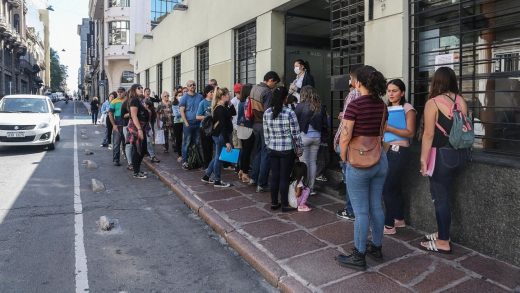Half of Uruguay’s COVID-19 cases can be traced to a single fashion designer
Carmela Hontou, a 57-year-old fashion designer, landed in Montevideo, Uruguay, from Spain on March 7 and had lunch with her 84-year-old mother. That evening, Hontou went to a wedding celebration in the wealthy Carrasco district, where she was one of 500 guests. She says she stayed for three hours, then left because she was tired from jet lag.
The Guardian reports that more than half of Uruguay’s coronavirus cases can be traced back to Hontou, who said her fever spiked the day after the wedding and who has since tested positive for COVID-19. After the party, 44 other guests tested positive for the virus. (It’s unclear whether Hontou’s mother is sick.)
At the time Hontou flew, Spain was already in the throes of the coronavirus crisis, with 525 confirmed cases. The Spanish government had already begun asking citizens to avoid large gatherings, as the virus was quickly spreading throughout Europe. (Now, the country is in lockdown mode, with more than 19,000 cases and more than 1,000 deaths.)
There are currently less than 100 confirmed cases of coronavirus in Uruguay, although there are several hundred suspected cases. That number is expected to rapidly rise, because the contagion is now spreading through South America.
Argentinian news outlet Infobae reports that Hontou’s name is now inextricably connected with the coronavirus in Uruguay, which is a relatively small country with 3.5 million people. In an interview with Infobae, Hontou said people were burning products she had designed and calling her a terrorist for bringing the disease into the country. But at the same time, she defended her decision to attend the party, saying that the groom was like a son to her, and that there were other people at the party who had recently flown in from Europe.
Hontou, who lives in Uruguay, told Infobae she has traveled to Spain several times in 2020, including a trip in January when she developed a fever. On another trip on February 22, she was concerned enough about the coronavirus that she wore a face mask as she left the plane.
According to The Guardian, Hontou could face legal charges. Article 224 of Uruguay’s penal code holds people accountable for knowingly spreading contagious diseases. Prosecutors may also investigate her sons, who have allegedly breached quarantine rules by visiting their mother, thereby possibly spreading the virus to others.
Hontou’s case is a stark example of how difficult it is for governments to convince citizens to self-isolate in the midst of this pandemic. In Argentina, for instance, the government mandated two weeks of time off from nonessential jobs, but citizens have used this time to go to the beach.
(11)



